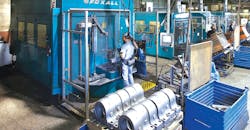Benton Foundry is a green-sand operation pouring ductile and gray iron castings in central Pennsylvania. Its six automatic molding centers produce components for industrial customers, parts that can be quite complex and detailed, requiring up to 50 chaplets in a four-core assembly. Now in operation for more than 160 years, its proprietors — the Hall family — have been active in the foundry industry for nearly 100 years.
In 2006, following significant growth and seeking to improve process efficiency, Benton began to evaluate its finishing processes. The operators foresaw changing demographics and recognized that finishing room personnel were going to be more difficult to hire — and even harder to retain.
As another challenge, one reason for Benton Foundry’s growth had been an expanded market focus: a new molding line made it possible to pour castings up to 250 lb. The finishing area was not set up to accommodate castings of that size efficiently, and manually handling castings over 50 lbs. would not be part of the plan.
Having worked with Vulcan Engineering in the past, Benton began the process of adapting the Foxall® automated casting finishing cell to its new process needs. Vulcan worked with the Benton team to fixture, program, and grind the parts. According to Benton Foundry president Jeff Hall, “… a great benefit was having three of our employees at Vulcan for several days getting familiar with the process.”
Once the Foxall was installed, the desired production goals were achieved, with much more consistent finished parts. Fixturing and programming could be accomplished easily, quickly, and inexpensively. Retaining operators rather than grinders has been a success, and abrasive costs also have been reduced significantly.
The robotic grinder’s closed-capture ventilation was another benefit, and this feature later proved to be an even greater advantage in light of revised regulations for reducing workplace-silica.
In 2010, Benton installed a second Foxall, equipped with Force Control technology, which monitors the force on the spindle, allowing a robot to be programmed to run faster than units without this feature. Also, using Force Control helps to protect the robot from mechanical abuse that may lead to expensive repairs.
Recently Benton added two more automatic grinding cells, including a larger Foxall 636 unit that further exceeded expectations, and significantly reduced the payback period when grinding castings up to 250 lb. “Generally, the larger the casting, the greater the productivity improvement,” Jeff Hall explained. “On the large end of our production envelope, we have had two operators replace seven floor grinders. In addition to time savings, both casting finish and consistency of grind have improved. The former floor grinders have been redeployed and the grinding room is a quieter, cleaner venue.”
Throughout the metalcasting industry, floor, bench, and stationary grinding have been highly labor-intensive activities, with positions held predominately by men. Robotic grinding changes the game. Operator fatigue is decreased, workplace safety is increased, and fewer personnel are needed. Plus, it is easier to find employees for machine operators than for manual grinders. The work is generally suitable for men and women of all ages, thus significantly increasing the pool of potential candidates to run these systems.
Benton Foundry’s quality control records now show a decrease in parts that need to be reworked and/or scrapped because the dimensional consistency of ground parts has greatly improved. This decrease in unacceptable parts also is due to having steady, accountable operators.
“The robotic cells are there every day, never take a shortcut, and remember all their instructions,” according to Hall.
Over the years, Benton has improved its cleaning-room process automation by adding hoists and other equipment, to make material handling faster and easier; working with Vulcan Engineering on more Foxall system features and programming options; and working with abrasives experts on new ways to grind faster, longer and more accurately, using various tools.
Currently, Benton Foundry is operating six Foxall units, and the objective is to continue improving automation while streamlining cleaning and grinding, to be able to robotically grind ~70% of all product within the next four years.
